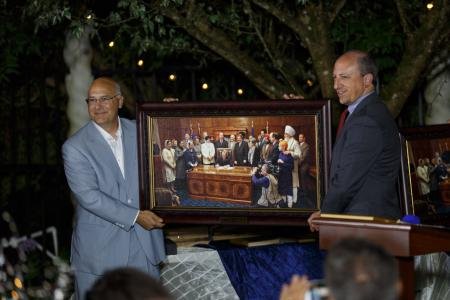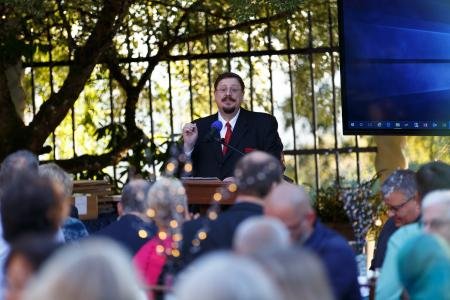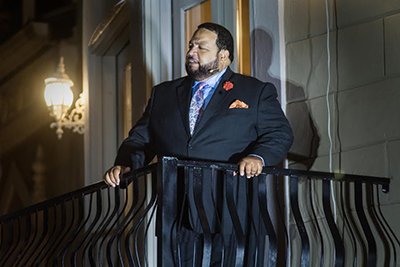[dc]O[/dc]n August 16, 2016, the Northwest Religious Liberty Association (NRLA) celebrated its 25th anniversary by highlighting key legislative achievements, including the passage of the Idaho Religious Freedom Restoration Act (RFRA) in 2000 and the two-part passage of the Oregon Workplace Religious Freedom Act (WRFA) in 2009 and 2010.

In his introductory remarks, NRLA president Gregory Hamilton described the role of the organization. “The role of the Northwest Religious Liberty Association is to build relationships with those on either side of the political aisle who will champion the values of religious freedom. Every effort we make to protect the religious freedom of each citizen also benefits the right of every person of faith to carry out their unique mission. Every time we fail to stand up for the religious freedom of others, we lessen our own a little more.”
When the North Pacific Union Conference was organized in 1906, it immediately founded the North Pacific Religious Liberty Association to counteract an ongoing threat of national Sunday laws. In 1922, Oregon gubernatorial candidate Walter Pierce promised to outlaw all private and parochial schools. The bill was inspired by the Ku Klux Klan which had claimed that Communism would most easily infiltrate the United States through Catholic Schools.
Hamilton pointed out that since most children attended public schools “it was mainly left to the Catholics, Seventh-day Adventists, Episcopalians and Presbyterians to protest such an unconstitutional proposal.”
In 1923, Governor Pierce signed the Compulsory Education Bill into law. The Oregon legislature also passed legislation outlawing the wearing of religious garb by public school teachers. Teachers who wore religious garb as part of their personal religious practice would lose their teaching credentials. Although the Compulsory Education law was unanimously overturned by the U.S. Supreme Court in Pierce v. Society of Sisters (1925), the prohibition on religious garb remained in force. As recently as 1986, the Oregon Supreme Court had unanimously upheld the firing and revocation of the teaching credentials of a Sikh schoolteacher, Janet Cooper, who had worn traditional white robes and a turban in violation of the 1923 law.
This law against religious diversity remained in place until 2010 when it was overturned in the second round of Oregon Workplace Religious Freedom Act legislation championed by the Northwest Religious Liberty Association and other religious and public interest groups. The Oregon Workplace Religious Freedom Act applies a fairer standard for religious minorities and all conscientious employees of faith seeking holy day and religious garb accommodations.
Hamilton and Max Torkelson, president of the North Pacific Union Conference of Seventh-day Adventists, gave special recognition to those who had assisted the organization in key moments of its history.

These included former Oregon Speaker of the House Dave Hunt who had introduced and reintroduced the Oregon WRFA from 2003 until it passed and fellow Democrat Brad Avakian who had pushed for the legislation both as a legislator and then as Oregon Commissioner of the Bureau of Labor and Industries. NRLA also recognized the work of Willamette University law professor Steven Green who served on the Governor’s post-signing commission to provide practical guidelines on the implementation of the legislation; Muslim public affairs advocate Saba Ahmed who tirelessly lobbied on behalf of the bill; and ReligiousLiberty.TV founder and attorney Michael Peabody who provided strategic advice and testified before the Oregon House Judiciary Committee.
The Oregon Workplace Religious Freedom Act was the final act in overturning a 1923 law that outlawed private religious education under the influence of the Ku Klux Klan. The law, initially passed to block Catholic education, was overturned in a 9-0 ruling by the U.S. Supreme Court (Pierce v. Society of Sisters). However, a provision that prohibited public school teachers from wearing distinctively religious dress in the classroom—revoking their teaching credential if they did so—remained on the books until 2010. While some organizations had subsequently interpreted the law as protecting the separation of church and state, Oregon law made it impossible for Sikhs among others to teach in public schools while retaining their personal religious convictions.

The NRLA also honored the late Idaho Senator Grant Ipsen who introduced and sponsored the passage of Idaho’s Free Exercise of Religion Act. The bill, passed in 2000 with the strong support of the NRLA, restored the “compelling interest” and “least restrictive means” legal tests to free exercise jurisprudence, so that when religious individuals’ and institutions’ religious practices are challenged by the state, the burden of proof was returned to the shoulders of the state.
Religious liberty and civil rights are intertwined. During his keynote address Walla Walla University Professor Timothy Golden, who is also an attorney, described how working toward the cause of civil rights strengthens the work of religious liberty. Golden noted that religious minorities rely on the anti-discrimination provisions of Title VII of the Civil Rights Act of 1964, but that “without the March on Washington in 1963, there would have been no Civil Rights Act of 1964.”

Awardees for service to the cause of religious liberty included Richard Fenn, the president of NRLA from 1991-98, Liberty magazine editor Lincoln Steed, Jim Wibberding who served as the chaplain of the Idaho Senate in 2012, NRLA vice president for legal affairs Charles Steinberg, and attorney Alan Reinach. Participants in the capitol pastor program, a program unique to the NRLA which trains and equips pastors in proximity to state capitols to provide legislative advocacy, also received medallions for their service.

The Northwest Religious Liberty Association addresses religious liberty concerns throughout the states of the North Pacific Union Conference of Seventh-day Adventists including Alaska, Washington, Oregon, Idaho, and Montana. In addition to the passage of the Oregon Workplace Religious Freedom Act and Idaho’s Free Exercise of Religion Act, the NRLA has also worked on behalf of Native American inmates in Washington State on policies that allow dual religious preference for prisoner registration in 2006, defeated the forced unionization of all private healthcare centers in Washington, and defeated Greater Seattle’s Growth Management Act in 2001 which attempted to place a moratorium on the building of new churches and schools in rural King County.
In recent years, the NRLA has also been active in international legislation. Gregory Hamilton, who has extensive knowledge on foreign policy issues, has traveled to Romania where he worked alongside local religious leaders to influence senators in the Romanian parliament to discourage a six-day work week law which would have allowed Sunday rest only and the constitutional recognition of the Romanian Orthodox Church as the only state-approved religion.

Looking forward to the next 25 years, Hamilton said, “We need to build relationships with more men and women on either side of the political aisle who will champion the values of religious freedom. Every effort we make to protect the religious freedom of each citizen also benefits the right of every person of faith to carry out our unique mission.”
###
For more information about the Northwest Religious Liberty Association, visit nrla.com
Photos by Anthony White for the NPUC Gleaner (for more photos of the event visit the Gleaner gallery).